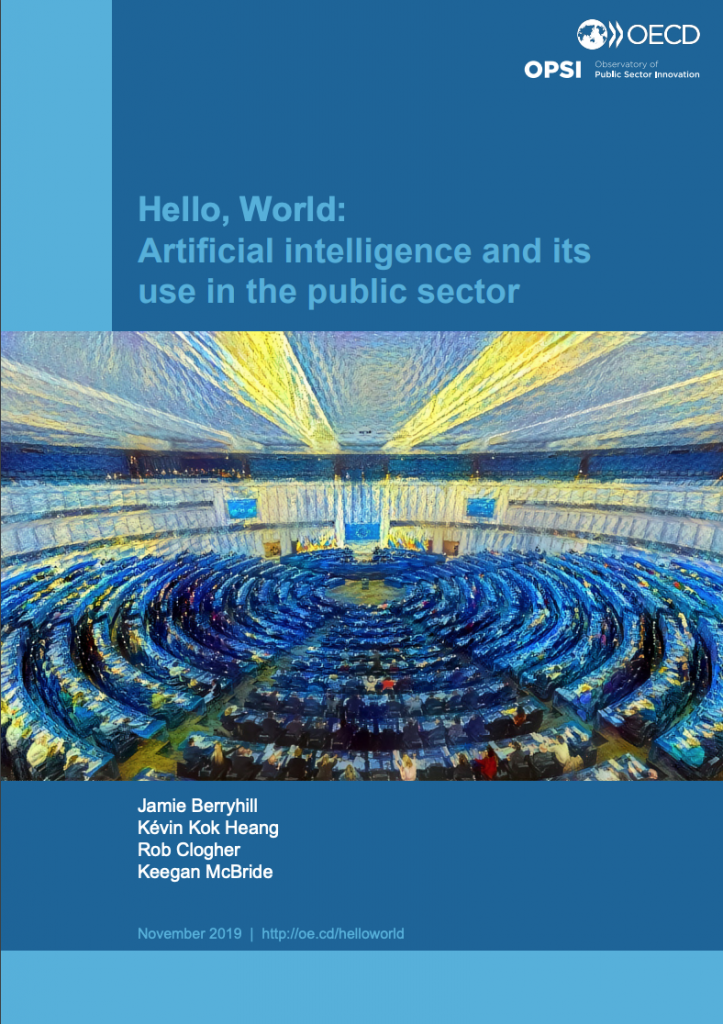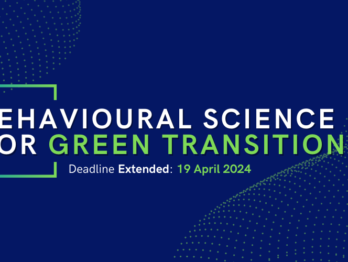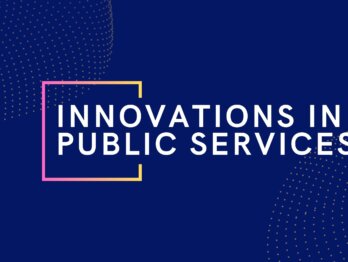Report Launch – OPSI Primer on AI for the Public Sector

Today, we’re excited to formally launch the final version of OPSI’s AI primer: Hello, World: Artificial Intelligence and its Use in the Public Sector. “Hello, World!” is often the very first computer program written by someone learning how to code, and we want this primer to be able to help public officials take their first steps in exploring AI.
The primer is the result of 10 months of research and analysis focused specifically on the use and implications of AI in government. It has benefited from the input of dozens of experts and stakeholders, including through a seven-week public consultation, which received about 1,500 comments from over 75 individuals or organisations, including governments, academics, AI experts, businesses, and civil society organisations. OPSI made many revisions and additions to respond to the feedback received. We’d like to thank everyone who participated in the process, and we’ve sought to recognise those who made particularly signficant and helpful contributions in the acknowledgements section of the primer (we hope we didn’t miss anyone!).
Objectives of the Primer
The AI primer is broken up into four chapters that seek to achieve three key aims.
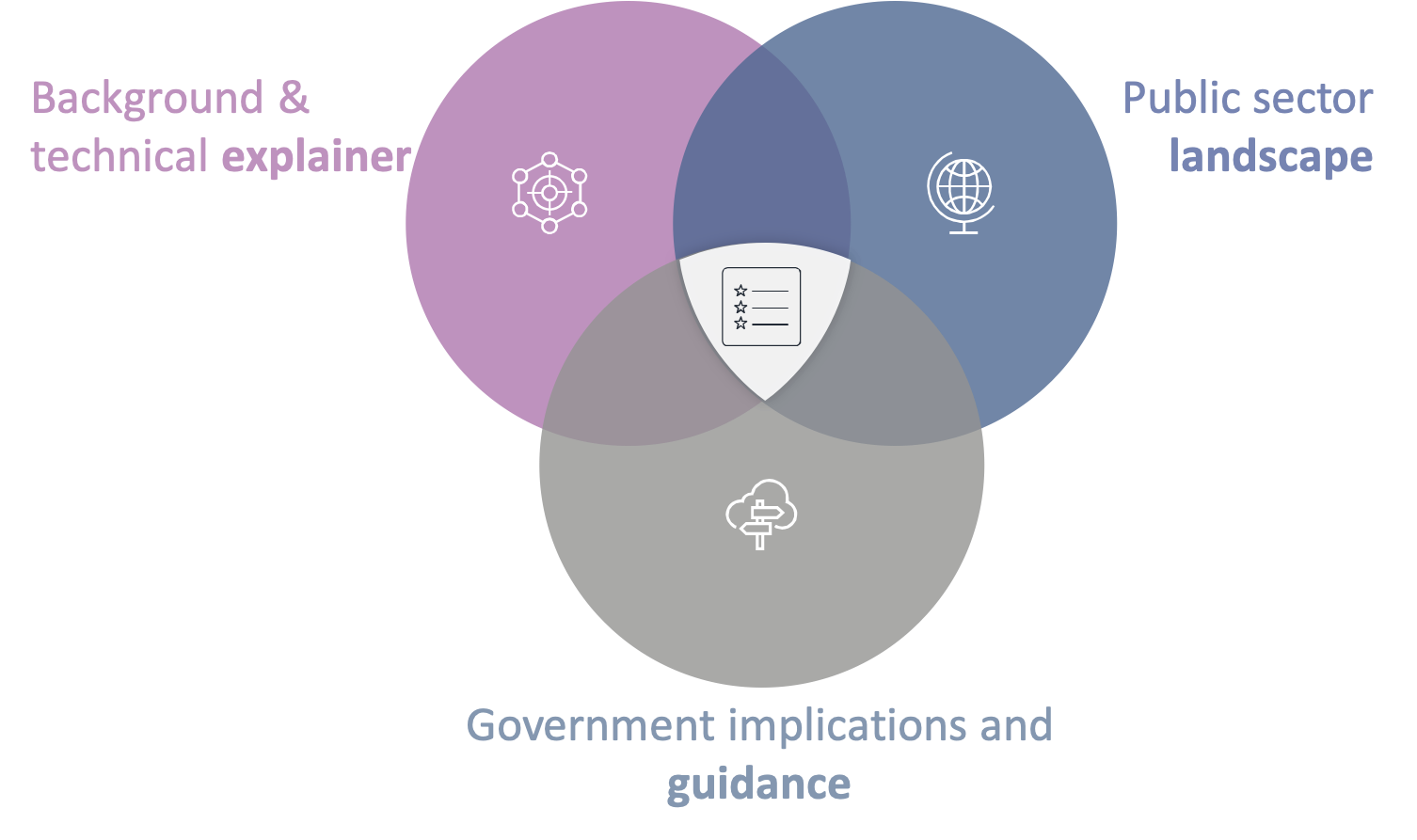
These elements are touched on below, as well as some details on how we seek to illustrate these objectives and to equip civil servants with tools and resources that can help them in exploring AI.
Background & Technical Explainer
For an overview of key definitions and reasons behind the current enthusiasm for AI, as well as for details on the technical underpinnings for AI and how different approaches can be useful for government, you’ll want to check out the full document (there’s a lot to cover!). The primer seeks to explain in simple terms complex concepts such as:
- Definitions of AI (and how there is no single one that everyone agrees on)
- Different types of AI (rules-based versus machine learning)
- Data as fuel for AI
- A deep dive on ways machines can learn and how machine learning can be applied
- Technical AI risks, challenges, and performance metrics.
These aspects of the primer can assist government leaders and public servants in many ways. For example, understanding some of the technical underpinnings can help officials decide which of these tools can best be applied to address specific problems, and become more empowered in negotiations with vendors seeking to sell AI or more traditional solutions.
Public Sector Landscape – AI Strategies
As a companion piece for the draft primer, we have also developed an AI Strategies & Public Sector Components page, which discusses each country’s complete or forthcoming national AI strategy. This includes a focus on the extent to which each specifically addresses public sector innovation and transformation. Our mapping has identified 50 countries (including the European Union) that have launched, or have plans to launch, national AI strategies. While at different stages of development, these include some common themes: economic development, trust and ethics, security and enhancing the talent pipeline. Of these 50 countries, 36 have (or plan to have) either separate strategies in place for public sector AI, or a dedicated focus embedded within a broader strategy. This is a positive and encouraging sign that governments are recognizing both the potential for, and challenges related to, public sector AI.
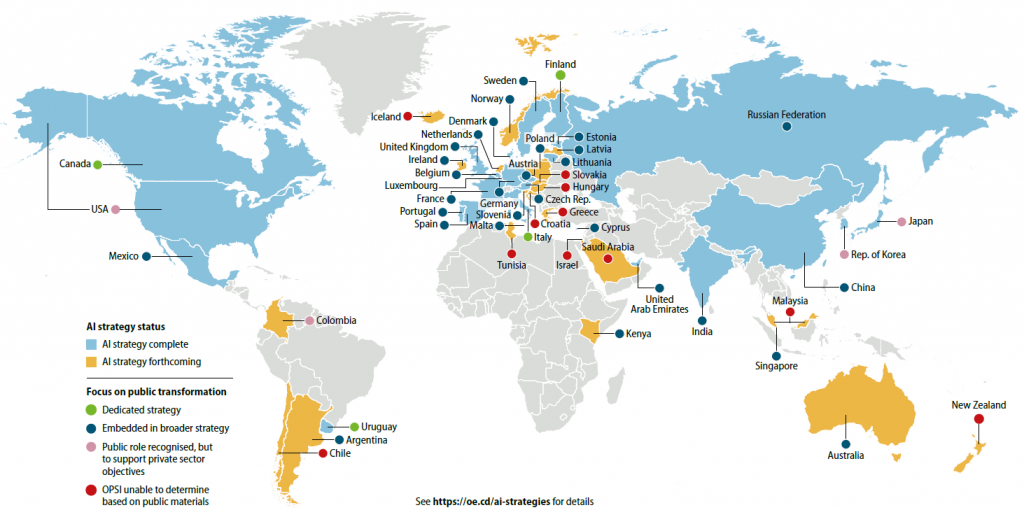
Government Implications and Guidance
While the potential benefits of AI are significant, attaining them is not an easy task. The field is complex and has a steep learning curve; and the purpose of, and context within, government is unique and present a number of challenges. To help governments learn about and explore AI in an effective and ethical way, the AI primer includes guidance on:
- Providing support and clear direction and create space for flexibility and experimentation
- Determine whether AI is the best solution for a given problem
- Providing for multi-disciplinary, diverse, and inclusive perspectives
- Developing a trustworthy, fair, and accountable approach to using AI
- Securing ethical collection of, access to, and use of quality data
- Ensure government organisations have access to adequate funding, internal and external capability and capacity, and infrastructure
- Recognising the potentially significant shifts that AI might bring in the future.
Examples and Case Studies
We’ve sought to make the AI primer as grounded in real-world practice as possible in order to illustrate key terms and concepts and to show readers what actions have already been done that may be able to be learned from or even adapted for other contexts. Throughout the document, readers will see dozens of real-world examples of efforts, projects, and other AI initiatives that are already occurring. These include seven in-depth case studies on specific AI projects, as well as policy initiatives that governments or their partners in other sectors are engaged in to leverage the potential of AI, while also seeking to mitigate negative consequences. These case studies are:
- Using AI to crowdsource public decision-making in Belgium
- Canada’s “bomb-in-a-box” scenario: Risk-based oversight by AI
- Finland’s National AI Strategy (including a dedicated public sector strategy)
- The European Commission’s Ethical Guidelines for Trustworthy AI
- Canada’s Directive on Automated Decision-Making
- United States Federal Data Strategy and Roadmap
- The Public Policy Programme at The Alan Turing Institute (United Kingdom).
AI Resources
Finally, based on public feedback seeking a repository of tools and resources that could be updated over time, we also published an AI Resources page to serve as an evolving directory of tools and resources that we believes may be useful for civil servants and leaders. Do you know of a useful resource we should add? Please let us know by leaving a comment on the AI Resources page, or by emailing us at [email protected].
Read the AI Primer
You can download and read the AI primer here.

